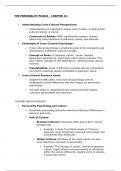THE PERSONALITY PUZZLE CHAPTER 13:
Understanding Cross-Cultural Perspectives:
Understanding an individual's unique view of reality, including their
cultural context, is crucial.
Construals of Reality: Differ significantly between cultures,
influencing interpretations of politeness, values, and behavior.
Challenges of Cross-Cultural Psychology:
Cross-cultural psychology is challenging due to the complexity and
unfamiliarity of different cultural concepts.
Concept of Amae: In Japanese culture, "amae" denotes
benevolent dependence, particularly within family contexts. This
term implies indulgence and dependence, reflecting deep cultural
nuances.
Translatability: Amae is difficult to translate directly into English
and carries meanings deeply embedded in Japanese culture.
Cross-Cultural Research Goals:
Despite the difficulties, cross-cultural psychology aims to
understand cultural differences and their impact on personality
psychology.
The field seeks to comprehend how cultural diversity shapes
individual personalities and behaviors.
CULTURE AND PSYCHOLOGY
Personality Psychology and Culture:
Personality psychology primarily examines individual differences in
behavior and traits.
Role of Culture:
Between Cultures: Individuals differ due to their cultural
backgrounds.
Example: A study found that people in China are
generally more emotionally reserved, introverted, and
considerate than Americans.
Within Cultures: Members of the same culture can also
show distinctive variations in personality.
Example: The concept of "amae," central to Japanese
culture, might influence the personality of individuals
within the culture differently, leading some to express
it more than others.
, Challenges for Personality Psychology:
Understanding how specific personality differences vary across
cultures.
Distinguishing how cultural contexts shape individual differences
within those cultures.
CROSS-CULTURAL UNIVERSALS VERSUS SPECIFICITY
Psychological Similarities and Differences:
The extent of psychological similarities and differences between
cultures remains a fundamental question in psychology.
The debate centers on whether differences are variations on a
universal theme or distinct due to cultural specificity.
Anthropological and Psychological Perspectives:
Anthropologists and psychologists have debated the existence of a
universal human nature versus cultural specificity.
These discussions resemble other longstanding debates like nature
vs. nurture or consistency in behavior.
Current Focus in Cross-Cultural Research:
There is ample evidence that culture significantly influences
individual differences.
Recent research has increasingly focused on psychological
similarities across cultures and on variations within cultures.
Future Challenges:
Understanding how universal psychological processes, like
personality and emotion, manifest in different cultural contexts
remains a key challenge.
Cross-cultural psychology needs to further explore how human
nature's common core interacts with diverse cultural influences.
WHAT IS CULTURE?
Defining Culture:
Culture encompasses the psychological attributes of groups,
including customs, habits, beliefs, and values that influence
emotions and behaviors.
Enculturation and Acculturation:
Enculturation: The process of learning the culture one is
born into.
, Acculturation: Adapting to a new culture when moving to a
different country.
Cultural Group Complexity:
Defining cultural groups is complex; they can be based on ethnicity,
nationality, language, and other factors.
Cultural differences can be found both within and across national
and linguistic borders.
Studies have compared cultural differences between various groups,
such as different regions within the same country.
Psychologists and Cultural Influence:
Psychologists themselves are influenced by the cultures they belong
to.
The profession of psychology might even form its own "culture,"
influencing how psychologists perceive the world.
THE IMPORTANCE OF CROSS-CULTURAL DIFFERENCES
Historical Neglect of Cross-Cultural Issues:
Historically, psychologists often ignored cross-cultural issues,
focusing instead on the groups they could study easily.
Freud primarily studied middle-class Viennese women, finding them
sufficiently complex.
Psychologists in Europe and North America often focused on
understanding individual differences, perception, cognition, and
behavioral change primarily within their cultural context.
Changing Attitudes Toward Cross-Cultural Psychology:
As research expands globally, the importance of understanding
cultural differences is increasingly recognized.
The U.S. Surgeon General has emphasized that "culture counts" in
understanding mental health disorders, interventions, and risk
factors.
Importance of Cross-Cultural Research:
International Understanding: Understanding cultural differences
fosters better international relationships and reduces
misunderstandings.
Applicability of Psychology: Researching cultural differences
assesses the extent to which psychological theories apply to people
globally.




